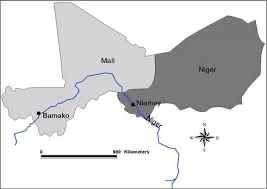To be a child in Nigeria is both beautiful and satisfying to a large extent…

Intertwined Destinies: Coup in Niger and Italy, Perspectives of a New Wave of Migration
The news is that Niger has been shaken by a military coup that overturned the democratically elected government, bringing political instability to Niamey, the capital. But how much could this situation have significant consequences on managing and containing migration flows in the region?
The most plausible hypotheses are that post-coup political instability creates a favorable environment for criminal activities, including groups involved in human trafficking and illegal immigration. Niger is an important route for African migrants seeking to reach Europe through the Mediterranean, and its geographical location is critical for controlling migration flows.
Before the coup, the Nigerien government had collaborated with the European Union and the International Organization for Migration (IOM) to address immigration through economic development projects and actions against human traffickers. However, political instability could compromise or even erase such efforts.
The consequences of the coup could affect vulnerable populations, including migrants and refugees from other countries, and with an uncertain political situation, the risk of human rights abuses increases, leaving people fleeing from violence-hit regions without adequate protection and assistance.
Equally plausible is that Niger’s instability could discourage foreign investments, reducing job opportunities in the country and pushing more people to seek escape routes through the desert and the sea.
Following the logic of economic opportunities, it is already known that Vice Premier Tajani announced an allocation of 16 million euros for projects in Libya and Niger aimed at managing the migration phenomenon. The interventions include training for local authorities, training courses for migrants and host communities, and assisted voluntary returns. Tajani emphasizes the importance of strengthening collaboration between Italy and Africa in countering migrant trafficking and promoting development and training opportunities for young people in countries involved in the migration phenomenon.
If this logic is to be pursued (I wonder how it is possible to implement economic controls in a military totalitarian regime), the European Union and other international actors with a direct interest in managing migration flows should maintain financial and logistical support for development efforts in Niger, despite the political instability. It is a fact that preventing desperate migrations also involves creating economic opportunities on-site, thus reducing the allure of risking lives in dangerous journeys.
The coup in Niger has created a situation of political and social instability that could plausibly have serious consequences on managing and containing migration flows. If we were to imagine scenarios resulting from this event (considering it purely speculative), we could hypothesize the following:
Scenario 1: Increase in migration flow to Italy
The political and social instability in the country leads to a significant increase in migration flows to Italy. Many people, frightened by violence and lack of protection, decide to undertake a risky journey through the desert and the Mediterranean in the hope of finding safety and opportunities in Europe. Based on past events, the migration flow to Italy could increase by 30% compared to pre-coup levels. This would mean thousands more migrants attempting to reach Italian shores each month.
Scenario 2: Increase in migration routes through the Sahara
Human traffickers could exploit the situation to open new migration routes through the Sahara, leading to an increase in migration flow to Italy from countries in West and Central Africa. In this scenario, traditional migration routes could be abandoned in favor of more dangerous and remote paths through the desert. Access to resources and rescue routes along these new paths would be limited, increasing the risk of loss of life in the desert.
Scenario 3: Strengthening containment and security measures
After the coup, Italy could strengthen containment and security measures to cope with the increased migration flows from Niger. This might include increasing surveillance patrols along the coasts and enhancing border controls. Such measures would be costly and require greater international cooperation to be effective. Moreover, strengthening security measures could generate domestic political tensions as well as diplomatic tensions with Niger and other West African countries, who may perceive these actions as a lack of solidarity.
Scenario 4: Diplomatic and development solutions
A more far-sighted approach could be to adopt diplomatic and development solutions in collaboration with Niger and other countries in the region. This could include supporting the restoration of constitutional order in Niger and implementing economic and social development programs to address the root causes of migration. Investing in development programs could create job opportunities and reduce motivations for migration for many people. At the same time, diplomatic solutions could foster cooperation between concerned countries to better manage migration flows in a humane and safe manner. However, the question remains: how will controls be implemented?
In conclusion, past experiences have shown that Italy has often been one of the main gateways to Europe for migrants from Africa. Therefore, it is essential to prepare adequately to face any potential increase in migration flows, ensuring a humane and rights-respecting approach to migration management.
Close cooperation with other European Union countries and international organizations is necessary to develop coordinated strategies and actions to address the impact of such events, strengthening cooperation and solidarity among European countries in jointly addressing migration challenges and seeking sustainable and inclusive solutions for all parties involved.
Only through a concerted approach based on principles of humanity and collaboration will it be possible to effectively respond to migration flows and the needs of those desperate for safety and hope.




